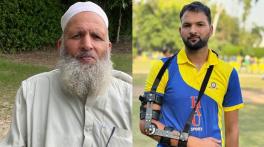Former England batter Graham Thorpe, who passed away at the age of 55 last week, took his own life after a long struggle with chronic depression, his wife Amanda has revealed.
The England and Wales Cricket Board (ECB) and Surrey County Cricket Club (SCCC), where Thorpe spent his entire First-Class career, announced on 5th August that the England veteran of 100 Tests had passed away.
Thorpe had stepped back from all coaching duties shortly after being appointed Afghanistan’s head coach in March 2022. His condition and the nature of his illness had been kept private since then.
However, in her first public statement since his passing, Amanda spoke to The Times’ Michael Atherton, Thorpe’s former England teammate, revealing his battle with depression. “Despite having a wife and two daughters whom he loved and who loved him, he did not get better. He was so unwell in recent times and he really did believe that we would be better off without him and we are devastated that he acted on that and took his own life.”
“For the past couple of years, Graham had been suffering from major depression and anxiety. This led him to make a serious attempt on his life in May 2022, which resulted in a prolonged stay in an intensive care unit. Despite glimpses of hope and of the old Graham, he continued to suffer from depression and anxiety, which at times got very severe. We supported him as a family and he tried many, many treatments but unfortunately none of them really seemed to work,” Amanda explained.
Thorpe was also involved in England’s coaching staff during their 2019 ODI World Cup triumph. Thorpe represented Surrey from 1988 to 2005 and accumulated over 21,000 runs in his entire First-Class career. Thorpe scored 16 Test centuries, including a career-best of 200 not out against New Zealand. The left-hander made his debut against Australia in 1993 at Trent Bridge, becoming the first Englishman in 20 years to score a century on debut.
“We are not ashamed of talking about it,” Thorpe’s eldest daughter Kitty, 22, said. “There is nothing to hide and it is not a stigma. We were trying to help him get better before and trying to protect him, which is why we said nothing. This is the time now to share the news, however horrible it is. We’ve wanted to be able to talk and share and we’d now like to raise awareness, too.”



























































